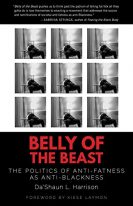Harrison, Da’Shaun L. Belly of the Beast: The Politics of Anti-Fatness as Anti-Blackness. 2021. $14.95 144p. PB. 9781623175979.

In this concise and engaging work of theory and societal commentary, Harrison goes beyond making a call to action towards body positivity and fatphobia. He makes the case for the reader to completely divest from, and eventually eradicate, the ways we’ve been conditioned to think about fatness, bodies, race, gender, and even self-love. In writing this book, the author – who identifies as trans non-binary, fat, Black and disabled – fills a glaring gap in the literature by critically exploring the intersections between race, gender identity and presentation, and body size. Harrison persuasively argues that many common cultural and medical beliefs and practices about weight, including the use of body mass index (BMI) measurements, diet culture, and traditional standards of beauty, are 1) built from a foundation of racist pseudoscience and 2) disproportionately dangerous and harmful to Black people. Harrison argues that because we often accept these assumptions and attitudes uncritically, they erase and endanger many of us. Shifting ideas and discourse around those ideas is therefore very necessary.
While the book holds high interest for academic audiences, especially those exploring Black studies and fat studies, this book has broad appeal because of the clear and engaging writing and the exciting, wide-ranging implications of building the better world Harrison imagines. Over seven compelling chapters, Harrison exposes various the profound anti-fatness inherent in the vital, omnipresent systems and institutions in our lives (e.g. – the criminal justice system, popular and mass media, healthcare, and policy behind the so-called “War on Drugs” and “War on Obesity”). This inequitable attitude towards larger bodies produces alarming physical and psychological outcomes and coaxes people towards harmful practices and beliefs. When this attitude intersects with anti-Black racism, the results for fat, Black people can be destructive and even deadly. This is explored adeptly in the chapter that explores how several recent infamous victims of police killings, like Michael Brown and Eric Garner, were significantly endangered by the mere fact of their size. Harrison includes damning testimony and police reports that show how the blame for their deaths was shifted to their size, rather than attributing them to violent encounters with police.
Another impressive highlight is the chapter on how anti-fatness and anti-blackness interact with trans and non-binary identities, often creating tremendous stress and confusion for people who live those identities. That chapter, the most personally written, breaks important new ground, as its topics have been inadequately covered in other literature. Most impressively, each chapter explores complicated issues like this, deeply and persuasively, without ever sacrificing brevity or clarity.
Although this is a scholarly work, I think the accessibility of the text is very intentional and well-executed. The introductory writings make it clear that Harrison wants to disrupt even general, colloquial understanding of these weighty topics and not merely interact with academia. As a result, though this book is certainly a must-have for academic libraries, it has plenty of food for thought for general adult readers who want to understand the troubling ways anti-fatness and anti-Blackness manifest themselves in our society, often in concert with each other. Readers will come away with a lot to consider, but also empowered to see the world and their own bodies in a radically different way. They may also find themselves eagerly anticipating the author’s next contribution.
Michael Mungin
University of Washington Bothell and Cascadia College